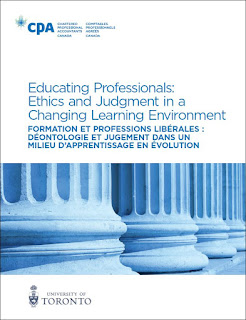In May 2005, the University of Lethbridge and the Institute
of Chartered Accountants of Alberta sponsored the Banff Education Conference
titled Professional Judgment: Can It Be
Taught? The opening forum at the conference was a panel discussion on the
topic presented by academics and practitioners. The session included an
overview of the research literature on expertise as a basis for considering the
nature of professional judgment and the implications of various attributes of
expertise for accounting education.
Past practises and current pressures facing practitioners in
exercising good judgment were addressed, including increased complexity of
transactions and decreased time to assess problems. The forum also included a
discussion of the need for educators to help guide students to develop an
understanding of a problem rather than simply seek the answer. There was a
discussion of particularly challenging topics for students to grasp in a
principles-based environment. The forum culminated in a question and answer
session involving the panelists and the attendees at the conference.

